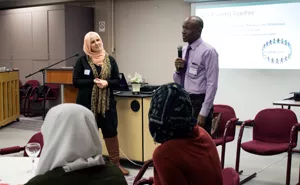
Syrian refugees get helping hand from UTM
When language studies professors at the University of Toronto Mississauga discovered that there was a dearth of English language classes for the city’s new Syrian refugees, they were eager to help meet the need.
The Department of Language Studies has created an eight-week English language curriculum for adult refugees and is hoping to roll it out prior to the holiday break with the help of the Syrian Canadian Foundation and the Helping Hands service club at UTM. The groups held a launch party for the program at the Faculty Club recently and were encouraged by the interest.
“When the Syrian Canadian Foundation reached out to us, we said, ‘of course,’” says Professor Emmanuel Nikiema, chair of the language studies department. “Outreach is part of the mission of our department.”
He conferred with the president of Helping Hands, who reached out to the club’s membership.
“The student response was really overwhelming and positive,” Nikiema says. “Within a week, we had 150 volunteers, and 50 of them were bilingual. We had more volunteers than participants in the program and this attests to the generosity and level of engagement of our UTM community.”
The student volunteers will be working closely with Elizabeth Coulson, the co-ordinator of the department’s education minor, and Jennifer Shields, both specialists in teaching English as a Second Language (ESL). The pair has developed the language portion of the curriculum and is working with the students to add a cultural component that familiarizes the refugees with life in Canada. The professors will teach the first session of classes, but they are training students to take on the teaching responsibilities themselves as the program progresses.
“The language studies department will provide professional learning support to UTM volunteers to help prepare them for their leadership roles as ESL instructors and coaches,” Coulson says.
Initially, the program will offer four hours of classroom instruction weekly to 30 Syrian refugees, supplemented with tutoring and outreach by the volunteers. If the first round of classes is a success, Nikiema envisions increasing the enrolment to 50 for a spring session. The instructors will assess the incoming students to determine their level of language proficiency and may run concurrent classes, depending on the needs of their students.
“Our emphasis will be on speaking, reading and writing,” Coulson says. “We want to provide an immersion environment for them.
“Generally, at the end of three months people generally have good enough comprehension to get around at the grocery store and bank.”
The faculty see the outreach effort as an opportunity to not only offer “pathways to the English language, but have the newcomers on campus with us. We want to introduce the refugees to our campus and reignite their interest in education and see where we can advance it once they’re settled.”
Professor Amrita Daniere, UTM’s vice-principal, academic, and dean, offered the new program any kind of support that was needed, “but other than space, they’ve subsequently asked me for nothing. They just ran with it.”
Daniere says she hopes this outreach effort is another indication that “UTM is an integral part of the Mississauga and Peel communities and a wonderful place to visit.
“Anything the university can do as a community to make the refugee experience more positive and less stressful, we’re happy to help.”
